SDGs Interviews: Talking Responsible Production with Hirotsugu Daishima

SARAYA is one of Japan’s leading companies that implement the United Nations Sustainable Development Goals (SDGs). This is the fifth chapter of SARAYA’s SDGs interview series telling the story of those behind SARAYA and how they are working to achieve these goals. In this edition, we spotlight Hirotsugu Daishima, the director of the Corporate Communications Division, talking about his unique background and SDG number 12: Responsible Consumption and Production.
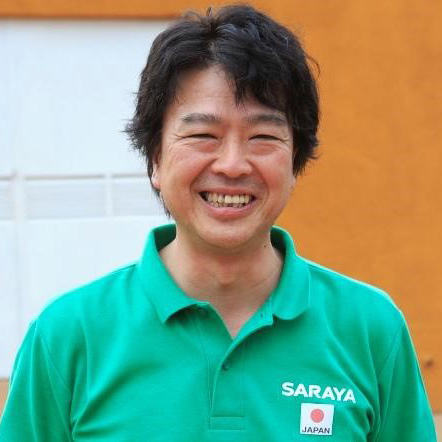 |
|
Could you tell us how a taxi driver came to work at SARAYA?
On a cold winter day in January 1995, I was driving around in Tokyo as a taxi driver. A well-dressed gentleman in his early 70s got in and asked me, in an Osaka accent, to take him to a place where he could find a book about land registration. I suggested that he go to Yaesu Book Center, one of the biggest bookstores in Japan next to Tokyo Station. As he did not have a clear destination, we started to talk. For a taxi driver, talking is part of the job, since if the passenger likes the driver, he could be a regular customer. I always tried to brush up my conversation skills as it saves a lot of driving.
He asked me why I was a taxi driver. I was in my late twenties and most of the taxi drivers in Japan were a lot older than me. I told him that I was a documentary filmmaker, but that job did not pay enough and I was married, just had a baby and needed money. Along the way, he realized I had FEN (Far East Network), an American military radio, on and asked if I spoke English. I told him I spoke some, that I was learning to speak English. The radio was for American military people outside of the US, but many young Japanese people who wanted to learn about American culture and speak English used to listen to the station back then.
The conversation got interesting and he asked me to stop the taxi and go to a coffee shop with him leaving the taxi meter ticking, which I had never done before. That gentleman was Mr. Shota Saraya, the founder of SARAYA.
He gave me his business card and introduced himself as the president of the company that makes Yashinomi kitchen detergent, which I told him that I used because I liked the bottle design. He told me about his company and after talking a while, he asked me if I was interested in working for his company.
A few days later, a package of SARAYA’s company profile booklet and product samples arrived at my house. A few days after that, his secretary called me and asked if I wanted to come for a job interview. I told her I had to talk to my wife first, to which she responded saying that she could come with me too, and sent 2 Shinkansen (Japan’s bullet train) two-way tickets to Osaka. I told my wife that we should at least go to tell my answer in person.
When we arrived at Osaka Station, the company car picked me up and took me to a very nice restaurant to meet Mr. Saraya and his wife. Afterward, I went to his office and met the company’s executives. I realized that it was hard to say ‘no’.
It has been 25 years since then, witnessing SARAYA’s growth over the years. Once upon a time, I wanted to become a successful movie maker, but I don't need to do it anymore as SARAYA itself became like a movie. SARAYA is a company full of stories and I am happy that I am a part of the story.
Could you tell us about your background?
I was born in Kumagaya, Saitama, a city 60 km (37 miles) northwest of Tokyo in Japan. My father worked at an automobile company in Tokyo and was a rice farmer on weekends, while my mother took care of my brother and myself while also working as a farmer. My 7-years-older brother, always cool to my eyes, became a film producer. Because of him, I was introduced to many great things like jazz and cinema at an early age. Jazz stars like Art Blakey & The Jazz Messengers and Sadao Watanabe were my heroes and I used to practice songs from the Charlie Parker Omnibook with my alto saxophone, dreaming of becoming a professional jazz saxophonist. In my high school years, I was a member of a school brass band and together with its members, I started a jazz big band. I used to sit in at local jazz clubs as well as clubs in Tokyo and had a part-time job at Toshiba factory making television parts after school to earn money to go to jazz clubs for about 2 years.
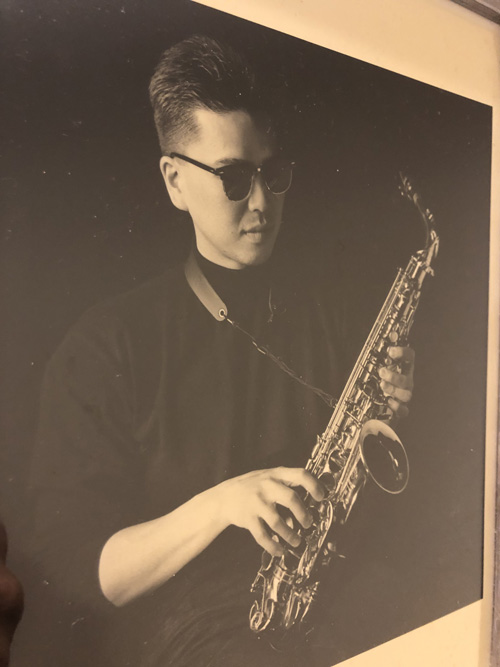
One day around that time, my mother seriously fell ill with a subarachnoid hemorrhage. Very luckily her brain surgery was successful and she was saved without any sequelae. It was a big wake up call for me to shape up my life.
It was time for me to turn around and make studying a priority. I aimed to go to Waseda University, a prestigious private university in Tokyo because they had a Modern Jazz Group, a popular extracurricular activity group where many renowned Japanese jazz musicians came from. As my high school score was not good enough to go to that university right away, my parents let me go to prep school in Tokyo for an extra 1 year, being later accepted into the university and majoring in western history, with a graduation thesis about witch hunts.
Once in university, my curiosity exploded again. Along with studying, I became a member of the Modern Jazz Group and had a part-time job as a proofreader at Recruit Holdings, a human resources company that published many popular recruiting booklets and magazines.
After graduation, I planned to enter medical school, working as a prep school instructor while I studied biology and science for the entrance exam. There, as I taught students who were getting ready to go to a high-ranking junior high school, I met a female colleague who would later become my wife. I didn’t end up going to medical school. I can’t say in detail what happened at that time.
I then worked as an assistant for my brother’s documentary movie project about a famous Japanese author named Shizuka Ijuin, followed him around for 3 months, meeting many interesting people around him. After that, as an editor for a car magazine called ‘NAVI’ (New Automobile Vocabulary for the Intellectuals), a popular stylish car magazine, discovering the new car models. Although the jobs I had were all interesting and exciting, none of them paid that well. So that’s why I became a taxi driver.
They say ‘nothing in life is wasted.’ and I can assure you that it’s true. I learned many different skills from all these experiences and have all been useful at some point in my life.
Did you create a lot of SARAYA's consumer products? What made you start non-additive, eco-friendly products?
When I joined SARAYA in 1995, although with plans to work in promotion and product development, I started as a human resources manager at the Tokyo office (Tokyo SARAYA) so that I could learn how a company functioned. I was in charge of hiring and visiting schools to talk about the company. I was lucky to have a boss, Mr. Kobayashi, intelligent and skillful that taught me a lot of things from how to write an agenda to business manners.
Once I was transferred to the Osaka office in Oct.1996, for the first two years, I visited the office of Mr. Shota Saraya every day. He was a great mentor and repeatedly told me, “As a manufacturer, we must create something unique, one-of-a-kind, new, that wows the world.” He also used to say, “When you have an idea, you must realize it.” I always remember his words full of passion and energy.
In 1996, there was an E.coli epidemic in Japan and we were busy having our factories in full production making disinfectants and sanitizers. That incident made me realize that I wanted to work in product developments and promotions. I got transferred to the product development and PR department and that’s what I have been doing for the last 24 years.
In terms of product development, I started in 1997 with a hand soap bottle with Pingu, a penguin character from a popular children’s television series my children used to watch. This hand soap series became a long seller that we still produce, combining a popular character with natural essential oils for fragrance instead of synthetic fragrance. Natural ingredients were always important for SARAYA, but somehow they still used synthetic fragrance, a change that I thought was important. I studied a book about aromatherapy written by Robert Tisserand and experimented with dosages of essential oils. We also came up with foam bottles for the first time so that children could have fun learning how to wash their hands. In 1998-1999, we won a competition and even did a collaboration to make shampoo for dogs.
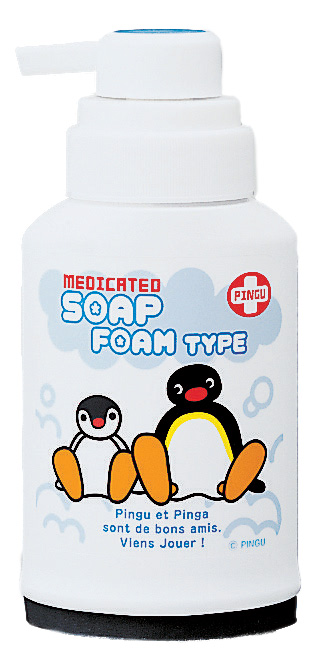
After that project, I came up with the idea of natural laundry detergents, something that SARAYA did not do despite being known for kitchen detergent made of natural ingredients. It all started when I went to pick up my children at kindergarten and I saw children with scratched wounds all over their bodies. Atopic dermatitis (AD) is a chronic, itchy skin inflammation that, often with swelling and broken skin, affects the whole body. The cause is still not yet known, but it is known that certain chemicals make symptoms worse.
I came to think about creating a new brand of safe, gentle laundry soap without chemicals for those children who suffer from skin problems, which with the help of many people, ended up with the creation in 2001 of the laundry soap series arau., which is gentle on skin, with 100% botanical ingredients, and free of additives such as synthetic fragrances, colors or preservatives. Arau means ‘to wash’ in Japanese, and was made with lavender (from the Latin word lavare, to wash) essential oils.
SARAYA is involved with many charities through their products. When did it start with cause marketing activities?
I believe the concept of arau. series was good, but the sales didn’t go as well as I thought. As we had a limited budget for advertising, we could not advertise it well. So in order to improve the brand image, we decided to try cause-marketing. Cause-marketing is marketing done by a for-profit business that seeks to both increase profits and to better society in accordance with its corporate social responsibility (CSR). I had been aware of some successful cases among companies that upgraded their brand image and enhanced sales while fulfilling their CSR. SARAYA has always been cautious about what they use as ingredients, one important reason why customers choose our products, so I thought this marketing style should combine well with our products.
We carefully sorted out which organization we could collaborate with and selected Save The Children, an international NGO that saves and improves children's lives around the world.
It was also an organization that Yusuke Saraya, the current president of SARAYA, was involved in establishing while he was the president of the Osaka Junior Chamber of Commerce in 1986.
Ever since 2004, we have been donating 1% of our seller sales to the NGO, growing the brand as an additive-free soap series gentle on the skin of moms and their babies. Since then, we have been focusing on cause-marketing in our corporate social responsibility in many ways with many of our consumer products. Currently, we donate 1% of our seller sales of many products like Happy Elephant and Yashinomi detergent series to the Borneo Conservation Trust, Hand Lab medicated hand soap and hand sanitizer to Unicef’s Wash A Million Hands Project and Lactoferrin, our cosmetic line with donations to JOICFP’s Safe Motherhood Project to protect mothers and babies in Uganda. We hope to have sustainable partnerships to make the world a better place, together with them as well as consumers.
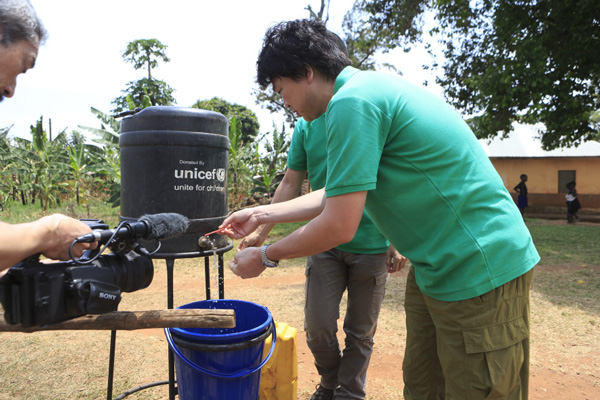
What was the most memorable project with SARAYA regarding SDG12, Responsible Consumption and Production?
The most memorable moment was when I went to Borneo in Malaysia with Nobuo Nakanishi, our researcher in 2005.
They say ‘Seeing is Believing’ and it was truly so. It was fascinating to see that such a totally different world existed in Borneo. There are people who live in the forest which is a natural resource, living by the river. The world seems primitive, but they have mobile phones and satellite TVs, in which you can watch CNN or the BBC and know about the world while living in a rainforest. In the equatorial area, the sun is strong and it rains a lot, but they have no typhoons. All those things were new to me and everything was breathtaking.
And then, I saw the huge palm oil plantations created from the destruction of rainforests and habitats of elephants and orangutans. The fact is that we consume palm oil in Japan and other parts of the world, we are all connected to this destruction. It’s not their problem, but ours. I felt the responsibility to do something about it as a person who witnessed the situation.
In 2004, SARAYA experienced a crisis. A Japanese TV program called "Wonderful Spaceship Earth – The Tears of Baby Elephants” filmed in Borneo in 2004, showing some wounded wild Borneo baby elephants that had lost their habitat due to the expansion of palm oil plantations. Our company president, Yusuke Saraya was on the program as a manufacturer that resourced palm oil. He honestly said that he did not know what was going on in Borneo, but the viewers were shocked and we received many complaints as a manufacturer that bought palm oil from Borneo. After the initial stun, the company hired Nakanishi, a researcher to examine the situation and establish the Borneo Conservation Trust, which started conserving nature in Borneo by 2007.
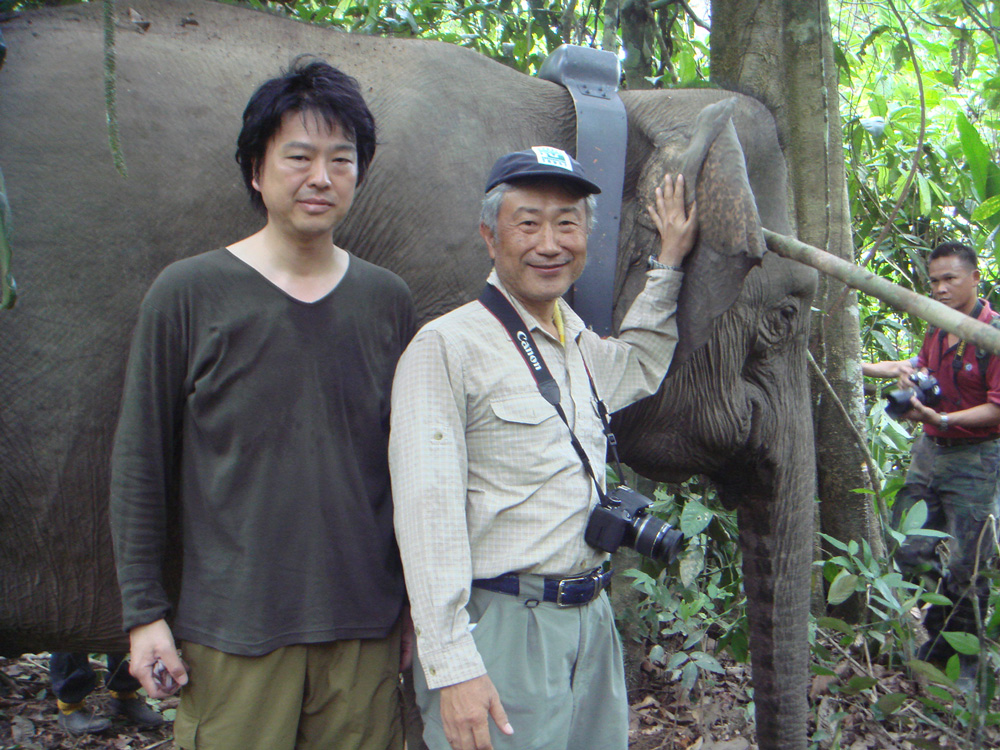
My trip was in between those two events. I thought this was the distortion of capitalism. We make a comfortable living with unlimited goods and services, but because of that, these animals lost their habitat. What I saw in Borneo changed my view and I started to think about Company Social Responsibility.
SARAYA was always a company to think about sustainability from the beginning. We, as a manufacturer, have the responsibility to buy and produce for our clients, but we cannot destroy someone else’s land just because we want to have a comfortable life. That was my turning point. I started to think about what we need to do as individuals as well as a company.
Since 2007, we have supported the Borneo Conservation Trust to acquire land along the riverbanks, the Green Corridor, a safe migration route for local endangered wildlife away from palm oil plantations to conservation land by donating part of the proceeds to BCT. That was the beginning of our trajectory to work with organizations to make the world a better place.
What is the future like with SARAYA’s CSR and SDG12?
I think SDGs (UN’s social development goals) will be incorporated into general consumption more and more. We are living in an era of wasting assets of future generations and it has come to the point that we can no longer keep doing it. I would like SARAYA to become a company and a brand that people choose in terms of ethical consumption.
I would like SARAYA to implement the concept of SDGs in all areas of our company, especially on the consumption side. When we pay more attention to SDGs from an ethical point of view, the cost of the products tends to go up, but by having transparency and informing our consumers why I believe we could all understand its value.
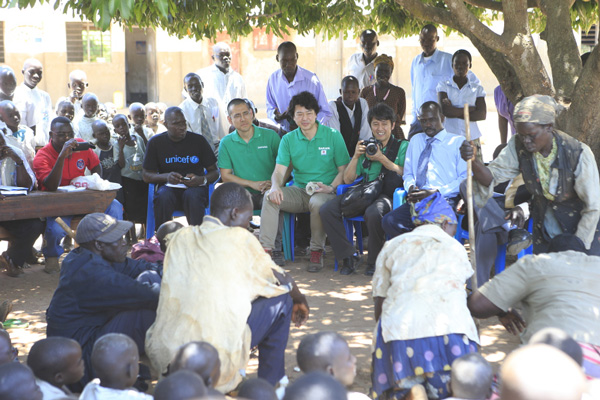
SARAYA has its own laboratory and we experiment to create products for the future. We have “SOFORO”, sophorolipids, a biosurfactant produced by nonpathogenic yeasts with our own formulation to be used in our detergent and cosmetics, creating next-generation detergents as it is biodegradable. We will need more products like this to protect our environment, but it is indeed more costly than synthetic and non-biodegradable detergents. Our job is to promote not only the products per se but also why we need to use these products for the sake of future generations, as well as why we donate part of proceeds.
I hope more people will join our movement.
Please give a message to the next generation
I always try to take action. It may not be perfect, but I believe you always come across something you never knew when you take action. You’d also meet people along the way and that's how you learn, with many things happening when you meet people. Meeting the right people makes the right things happen.
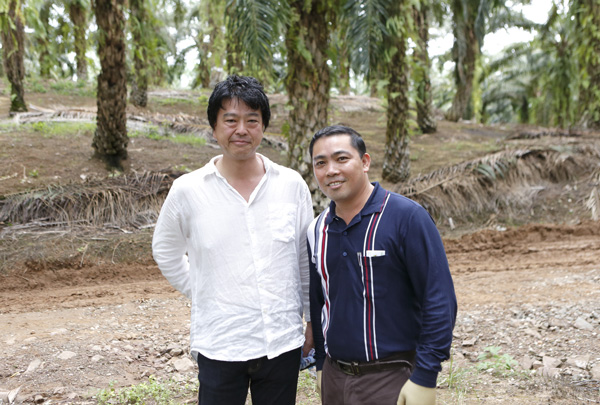
Also, I try to interpret what is happening in front of me, the people I meet, and the inevitable consequences I come across. My policy is to make my own decisions. I never felt I was forced to do so. It's your life, so you make your decision.
My advice for the next generation is: as long as time allows, study whatever you are interested in well. If possible, visit the site to see things, listen to people's voices, make your own judgments. Take action to live without regrets.
Improving the sanitation, the environment, and health of the world.
Social

© Copyright Saraya.Co.Ltd 2024 All rights reserved.